Author: Azariah Mosiwa
World Youth Day celebrates the power and potential of young people to drive change in their communities and the world. This year's theme, "From Clicks to Progress: Youth Digital Pathways for Sustainable Development" highlights the critical role of digital tools in empowering youth and fostering sustainable development. In line with this theme, a Photovoice study conducted in Malawi provided valuable insights on the experiences of young people living with and impacted by tuberculosis (TB), demonstrating the effectiveness of digital storytelling in creating potential solutions and improving health services.
Tuberculosis remains a significant global health challenge, particularly in Malawi, where young people aged 15-24 face numerous barriers to accessing timely and appropriate TB diagnosis and treatment. In response to these challenges, the LIGHT consortium team in Malawi conducted a Photovoice study to actively engage young Malawians impacted by TB in sharing their lived experiences and in providing suggestions to improve TB services among young people.
What is Photovoice?
Photovoice is a participatory research method that enables participants to capture and reflect on their lived experiences, challenges, and perspectives through photography. This visual storytelling not only offers deep insights but also amplifies the voices of those directly impacted by a certain issue, stimulating dialogue and social change within their communities.
How was the Photovoice conducted?
The Photovoice study in Malawi engaged 12 young people (7 males and 5 females), aged 15 – 24, from Lilongwe, including five currently undergoing TB treatment, four who had completed TB treatment, and three caregivers of individuals with TB. After being trained in research ethics and photography skills, the participants took photos in their homes and communities for two weeks to portray their situations, challenges and hopes.
Participants then thematically analysed their photo stories and presented their findings to 12 stakeholders working in TB policy and programming during an action workshop. This workshop facilitated a dialogue on approaches for optimising TB services for young people, leveraging participants' insights to inform policy and practice.
Key findings
The study revealed several key challenges faced by young people affected by TB including:
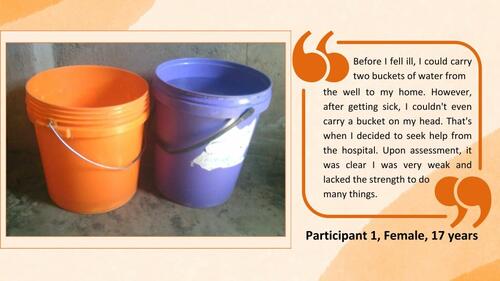
Physical health challenges
Participants reported significant physical weakness and shortness of breath, severely limiting their daily activities, and negatively impacting their quality of life. Persistent coughing and rib pain were common, compounded by the side effects of TB medication.
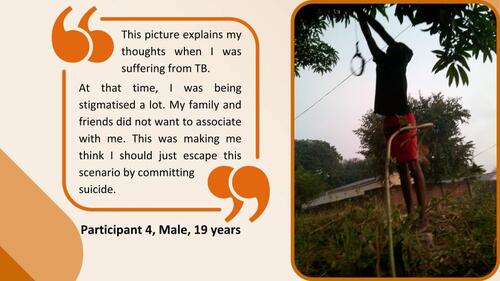
Mental health challenges
These physical health challenges were often exacerbated by mental health issues, including sadness, depression and the stigma associated with TB, leading to feelings of isolation and discrimination.
These testimonies signify the constant struggle of managing the physical symptoms of the illness and dealing with the psychological effects, exacerbating the suffering of these young individuals.
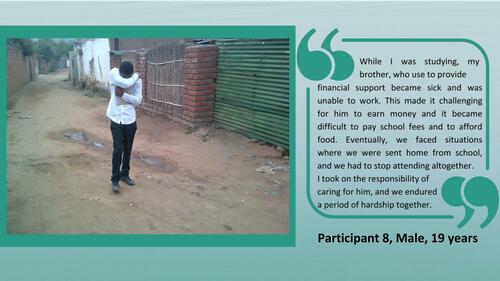
Socio-economic challenges
TB also disrupted participants' education and economic activities, forcing many to abandon their studies or jobs. Additional financial strain on their families was amplified by high medical costs and frequent hospital visits.
This diversion of financial resources highlights the broader economic impact of TB, affecting not just health, but also the social and future prospects of these young people.
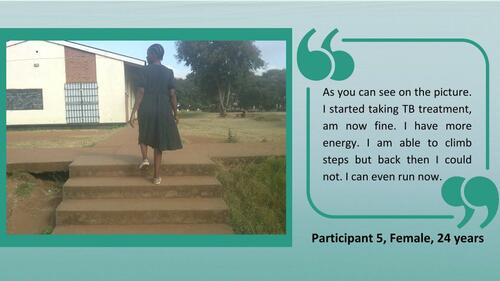
Positive Experiences and Coping Mechanisms
Despite these challenges, the study highlighted the resilience and positive coping mechanisms of young participants affected by TB. Many found solace in religion and spirituality, drawing strength from their faith to cope with their illness. Support from friends and family played a crucial role in alleviating emotional distress and fostering a sense of belonging. Stories of recovery from others provided hope and encouragement, reinforcing the importance of adhering to TB treatment and attaining positive health outcomes.
Way Forward
The action workshop, where participants shared their photographs and narratives with key stakeholders - including healthcare providers, TB programme managers, community leaders, and policymakers - demonstrated the potential impact of using digital tools and storytelling in enhancing stakeholders’ engagement and driving policy change. The visual narratives made the discussions more relatable and impactful, prompting stakeholders to explore practical solutions for improving TB services for young people.
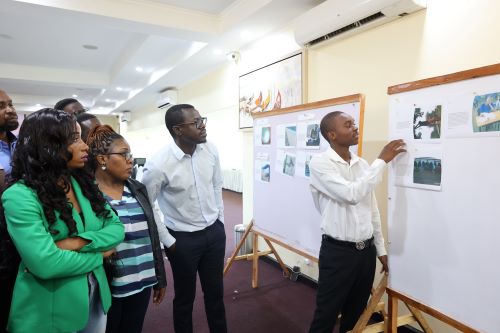
The workshop concluded with a set of recommendations for improving TB services for young people, including the establishment of peer support groups, the provision of youth-friendly healthcare services, and the implementation of targeted outreach programmes to ensure timely diagnosis and treatment. Stakeholders recognised the need for comprehensive public health education to reduce stigma and improve awareness about TB transmission and treatment. They also emphasised the importance of integrating mental health support into TB care, given the significant psychological impact of the disease.
Participants reported feeling empowered through taking part in this photovoice study, providing them an opportunity to share their stories and amplify their voices. Stakeholders acknowledged the value of Photovoice as a tool for community engagement and advocacy, noting its potential for application in other health and social issues.
Conclusion
The Photovoice study in Malawi underscores the transformative power of digital tools in youth engagement and empowerment. It demonstrates how digital storytelling could bridge the gap between young people's lived experiences and policymaking, fostering a more inclusive and responsive healthcare system. By leveraging digital pathways, young people can play a pivotal role in driving sustainable development and addressing pressing health challenges within their communities.
